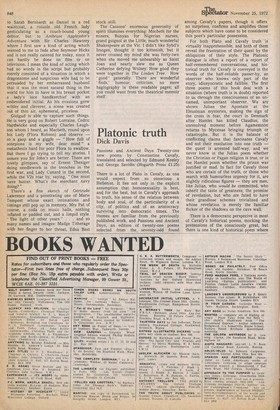Old-stagers
Philip Hope-Wallace
Distinguished Company John Gielgud (Heinemann £2.50) Lewis and Sybil John Casson (Collins £3) The assumption that all actors and actresses are interesting leads to a fatal amount of What Porridge Had John Keats journalism. To a point which led me once in a moment of critical indigestion to assert that the private lives of actors were essentially boring often in direct ratio to their effulgence on stage: which drew wounded sighs of dissent. But if I revoke too hasty and sweeping a remark, and I must do so for many of the subjects and two in particular of these books are highly interesting living people, nevertheless I stick to my guns. Actors and actresses may be more interesting than dentists but a lot of the interest is still adventitious. An actress who makes you cry in La Dame aux Camelias may seem to lead a more interesting private life than your dentist who makes you wince in his chair. But it ain't necessarily so.
These books gave me great pleasure, though of a different kind. Sir John's is delicate assessments. The Cassons' son is breezy and boisterous; one often comes on dramatis personae one does at once identify (" Ba cabled at once "). But it has the sweep called for by such sweeping, larger-than-life, uplifting people. To my special delight Sir John starts off with an evocation of Chu Chin Chow (and that is where I came in) and I confirm that he gets it exactly as it seemed (and has lingered) in my childish eye. The camel who misbehaved, the potter who made pots you could buy for nanny in the interval, Lily Brayton's arms and voice, Oscar Asche and Curtis Pounds . . . 'When it's Moonlight on the Nile' and 'Any Time's Kissing Time.' If I couldn't have opera, I'd settle for this. Lo, Sir John then moves on to the second theatrical miracle of my first days of "being taken" . . . not
to Sarah Bernhardt as Daniel in a red waistcoat, a voluole old French lady gesticulating as a couch-bound young debtor, but to Ambrose Applejohn's Adventure with Sir Charles Hawtrey where I first saw a kind of acting which seemed to me to fade after Seymour Hicks and is not really catered for today, since it can hardly be done on film or on television. I mean the kind of acting which had no words in the script but probably merely consisted of a situation in which a dragonsome and suspicious wife had to be persuaded by her embarrassed husband that it was the most natural thing in the world for him to have in his breast pocket a lady's lace handkerchief with an embroidered initial. As his evasions grew wilder and cleverer, a scene was created out of thin air, ephemeral,. priceless.
Gielgud is able to capture such things. He is very good on Robert Lorraine, Cedric Hardwicke and especially Charles Laughton whom I heard, as Macbeth, round upon his Lady (Flora Robson) and observe — co a gasp and a giggle — "How full of scorpions is my wife, dear mind" a metathesis hard for poor Flora to swallow. But there I go trying to tell my stories. I assure you Sir John's are better. There are lovely glimpses, say of Ernest Thesiger doing needlework in the trenches in the first war, and Lady Cunard in the second, while the V2s roar by, saying, "One must have butter. What's the merchant navy doing?"
There's a fine sketch of Gertrude Lawrence and a penetrating one of Marie Tempest whose exact intonations and timings still pop up in memory, Mrs Pat of course, a ,coda on music halls, nothing inflated or padded out, and a limpid style.
The light of other years" . . . and so many names and images: Madge Titherage with her finger to her throat, Edna Best stock still, The Cassons' enormous generosity of spirit illumines everything: Macbeth for the miners, Bunyan for Nigerian nurses, grand guignol at the Little, much wonderful Shakespeare at the Vic. I didn't like Sybil's Imogen, thought it too kittenish, but it never crossed my mind she was forty-two when she moved me unbearably as Saint Joan and nearly slew me as Queen Catherine defying Wolsey. How good they were together in The Linden Tree. How ' good ' generally. There are wonderful finds,' humour, criticism, no mere hagiography in these readable pages; all you could want from the theatrical memoir shelf.













































 Previous page
Previous page